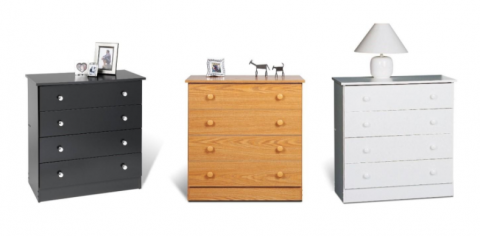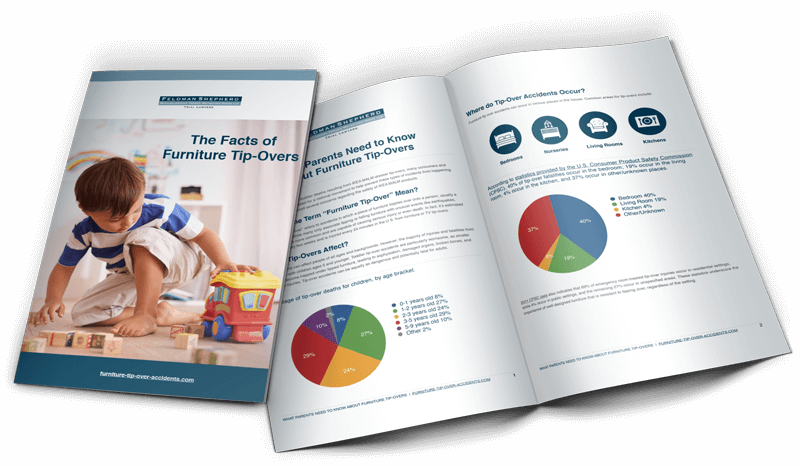In what is likely to go down in the annals of furniture recalls as a fundamentally flawed and inadequate remedy, furniture maker Prepac has recalled about 21,000 unsafe and unstable dressers without offering any meaningful remedy to its customers.
On May 6, 2020, Prepac issued a joint recall with the Consumer Product Safety Commission for 21,000 of its Prepac 4-drawer chests with plastic drawer glides. According to the recall notice, the chests are unstable and can tip over if not anchored to the wall, posing serious tip-over and entrapment hazards that can result in death or injuries to children. The recalled chests were sold online at Overstock.com, Target.com, Amazon.com and other online retailers from April 2005 through September 2018 for about $75. The chests came in three finishes, black, oak and white. The following model numbers are included in the recall and are printed on the instruction manual: BEP-3031-4, BBD-3031-4, OBD-3031-4 and WHD-3031-4.
The recall notice does not offer a financial refund for the furniture, but instead instructs consumers to stop using the recalled chests if not properly anchored to the wall and place them in an area that children cannot access. Consumers are told to contact Prepac to receive a free tip-over restraint kit and that they can request a one-time, free in-home installation of the wall anchor strap. The notice states that the in-home remedy may be delayed due to COVID-19 restrictions.
Edward S. Goldis, a product liability attorney at Feldman Shepherd Wohlgelernter Tanner Weinstock Dodig LLP, said the recall is inadequate for two reasons. First, by not offering a refund, Prepac is not incentivizing its customers to get the dangerous dressers out of their homes. Second, because it is well-established that consumers do not anchor furniture to a wall, it is likely that this recall will not result in any meaningful safety benefit.
Goldis cited a 2018 investigation by Consumer Reports that found that only 27 percent of Americans have ever anchored any type of furniture in their home. Survey respondents gave the following reasons for not doing so:
- Their children are not left unattended around furniture. Note, however, that most dresser tip-overs happen when children wake up after a night’s sleep or from a nap, when they’re often alone in their bedrooms.
- They thought the furniture was stable enough.
- They didn’t want to put holes in their walls.
- They weren’t sure what hardware to buy.
Goldis added that wall anchoring is not practicable for consumers who are not permitted to make holes in apartments they rent, or who have baseboard heating, which prevents the dresser from being positioned flush against the wall, or who have masonry walls that cannot be penetrated without special power tools, or who simply don’t know how to use power tools themselves.
Even for customers who want to take Prepac up on its offer for the one-time free installation of the wall anchor strap, their children will remain at risk until public health concerns caused by COVID-19 allow for this in-home remedy. The risk is heightened as families continue to shelter in place, and young children are at home 24×7.
Goldis responded to the news of the recall as follows: “We were exceptionally disappointed to learn that this recall not only fails to consider the low rates of tip-over restraint use, but also gives zero incentive to consumers to remove this product from their homes. We don’t understand how the Consumer Product Safety Commission allowed this type of recall to occur.”
Prepac’s recall came on the same day that Feldman Shepherd turned up the heat against furniture giant IKEA over an ineffective recall in 2016 that left millions of dangerous dressers that could tip over and seriously injure or kill young children in people’s homes. On May 6, 2020, Feldman Shepherd filed a class-action lawsuit in federal court in the Eastern District of Pennsylvania against IKEA seeking damages for consumer protection violations, IKEA’s failure to issue refunds as promised in the recall, and for IKEA’s inadequate attempts to notify purchasers of the recall.


